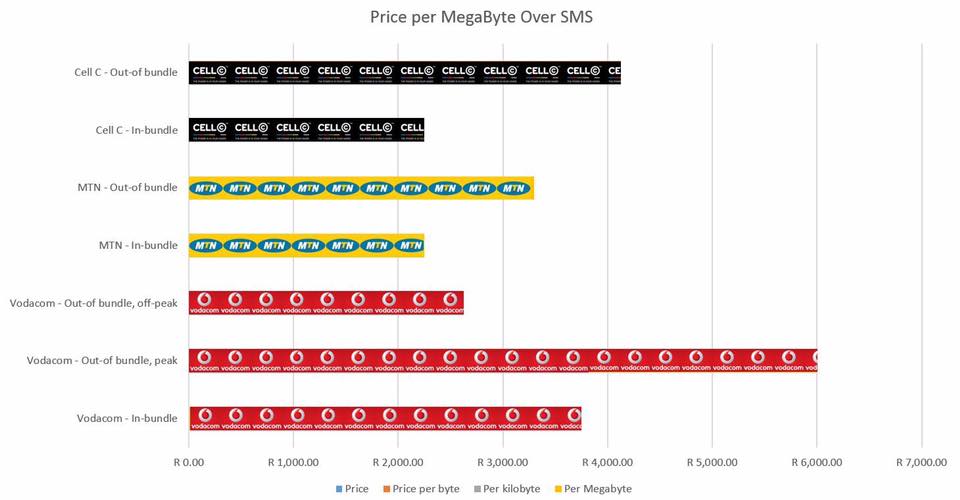
The picture that started this.
Contents
Introduction
R15 000 a song. How’s that sound? It’s not some new RIAA settlement. It’s something far closer to home.
The SMS, or Short Message Service, has been wildly successful over its history. Initially conceived of as a way for technicians to communicate with towers, it ballooned into the most popular method for people to communicate with one another, however sparsely. As per the below graph, found here, there are millions of them flying through the air at any time.
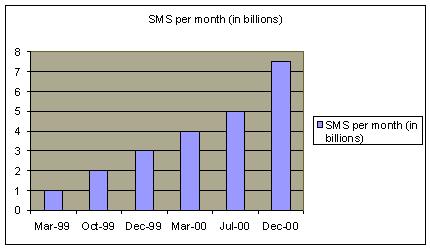
Data source: http://www.gsmworld.com/gsmdata
But has it kept pace with modern communication? How expensive is it? Why? Whyyy?
I created the graph at the top of this article to answer that question, then figured that, given the attention, I should explain what’s going on a little. So, here goes. We’ll get a little technical, but it’s just to drive home the point of how much profit is being made here.
Information.
An MP3, a blog post. A love note. From a computer point of view, this is all information. Before it’s information, it’s data. And data is just transmitted signals, just off’s and on’s. The amount of data isn’t the most important thing, but it’s important. From a standard communication point of view, it’s the number of characters you put out.
The number of characters that can be typed in an SMS varies, from 70, to 140, to 160 depending on the format involved.
Despite their different lengths, all of these formats take up the same amount of space in the SMS – 1120 bits (a bit is exactly one 1 or 0). That is, a series of 1120 0’s and 1’s. How can this be? Well, it’s all got to do with how we store characters in computers. How we encode them, which is just something we agreed on (sorta) years ago.
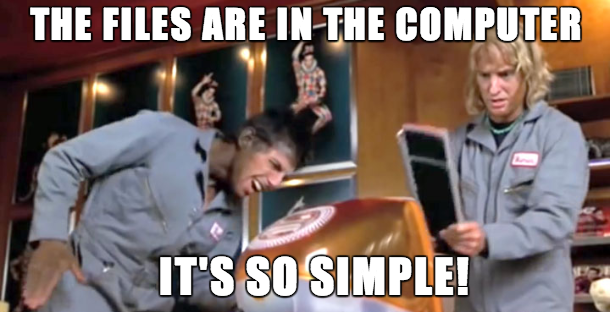
Data in computers is stored in 0’s and 1’s. Everyone seems to know that nowadays, although some are a little unclear as to how that could actually happen. More accurately, information is stored as groups of 0’s and 1’s – there are large charts with agreed-upon standards that say, “We’ll call this combination of letters an ‘A’. This next group a ‘B’. And this longer group a ‘™'”
Some of these standards use more bits than others, because some of them need to encode more characters than others. If all you need is the standard Latin alphabet, say A-Z, a-z, 0-9 and a couple of punctuation marks, then the amount of space you’re going to need is a lot lower than if you were going to create a table that could handle every alphabet humanity has invented, and leave some space for new ones. This is why some SMSs can send 160 characters, and some can only send 70. Imagine hand gestures for thumbs up and thumbs down, verses an entire sporting team’s secret playbook.
Nonetheless, despite our large detour, SMSs all store the same amount of actual data – 1120 bits. That’s what you push into the air each time you send one.
But what does it mean?
When SMSs started gaining in popularity, there weren’t that many people slinging bits around the Internet. Nowadays that’s quite different – we are bit explosions, leaving trails of 0’s and 1’s pouring into the air around us like some sort of digital halo as we travel. To illustrate the point, here’s 1120 bits, the number sent into the air with every SMS.
|
1 2 3 4 5 6 7 8 9 10 11 12 13 14 15 |
0101010101010101001010101010101011010110100100010010100100110100110101001010010 1001101101001001010100100101001001010100010101010101010100101010101010101101011 0100100010010100100110100110101001010010100110110100100101010010010100100101010 0010101010101010100101010101010101101011010010001001010010011010011010100101001 0100110110100100101010010010100100101010001010101010101010010101010101010110101 1010010001001010010011010011010100101001010011011010010010101001001010010010101 0001010101010101010010101010101010110101101001000100101001001101001101010010100 1010011011010010010101001001010010010101000101010101010101001010101010101011010 1101001000100101001001101001101010010100101001101101001001010100100101001001010 1000101010101010101001010101010101011010110100100010010100100110100110101001010 0101001101101001001010100100101001001010100010101010101010100101010101010101101 0110100100010010100100110100110101001010010100110110100100101010010010100100101 0100010101010101010100101010101010101101011010010001001010010011010011010100101 0010100110110100100101010010010100100101010001010101010101010010101010101010110 10110100100011 |
That almost seems like a lot… when we’re talking in SMS terms. That is, really old terms.
Nowadays we don’t ever talk about sending bits – 0’s and 1’s are tiny. In fact, we don’t talk about the next bigger unit either, the byte. A byte is 8 bits, and commonly encodes a single letter. That’s why, especially familiar in the encoding system used in South Africa, our SMS’s are made up of 140 characters. 1120 bits, divided by 8, give us 140 bytes, with one character in each one.
A standard length MP3 is around 3 megabytes big. 3 megabytes is 3 145 728 bytes. That means that to send a single MP3 over SMS, you’d need to send around 22 470 SMS’s. That would get quite old shortly before the end of the first beat, but at least we’re all good at sending SMS’s.
Hold on, 22 470 SMS’s? That’s a relatively familiar expense, per SMS at least… of the top of your head, what would that cost?
It costs what?
The value I have in my head for a single SMS, retrieved from who-knows-where (we’ll get to some accurate values shortly), is 70c an SMS. At this value, to send a single song over SMS, it would cost
22 470 x R0.70 = R15 729
R15 729. That’s right, at the rate companies charge for SMSs, it would cost you over fifteen thousand rand to send a single average length song. Can you imagine what it must cost them to keep the SMS network in place? Are you feeling some sort of new amazement at the size of the system around us?
… or are you growing just a little bit suspicious?
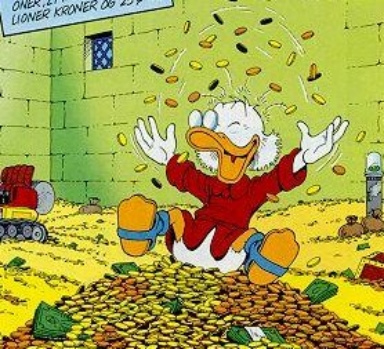
It costs them what?
In order to understand how much an SMS costs to send, we need to understand a little bit about SMS’s.
SMSs are, at their most basic, a fairly sneaky hack (to use the original meaning of the word) that occupy excess space within messages that are being passed between your cellphone and the base tower it is currently connected to. They communicate constantly, in order to work out a range of administrative things, and it is in the space leftover in these messages that the SMSs are slotted.
To put it another way, the cost to the telephone company of sending a single SMS is effectively R0.00. Yes, it’s (for all practical purposes), free.
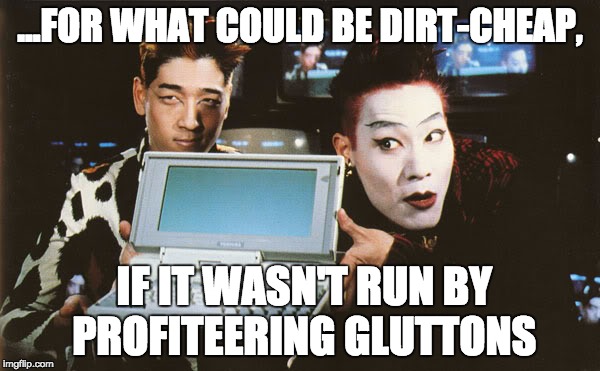
Surely it can’t be true?
You’ve seen the math behind it – it’s a relatively well known idea. Prior to starting this, I tweeted at the big three of Vodacom, MTN and Cell C to try find out what they thought their prices were like.
Hey @Vodacom,@MTNza, @CellC, how amazing are your data prices?
— Evan Knowles (@EvanJKnowles) June 14, 2016
They replied with their bundle prices, but nothing more. So I went from website to website, and collected the following data.
It turns out my memories of prices were slightly inaccurate, but relatively accurate on average. I put together the graph you saw at the top of this article, and tweeted at them asking if they would all check my math.
So, @Vodacom @MTNza @CellC, could you check my math? Looking for the best. (@kenneth_clark1) pic.twitter.com/wQ4eHbxNtu
— Evan Knowles (@EvanJKnowles) June 14, 2016
They didn’t reply, which is a fairly strong indicator that they acknowledge the ridiculous prices.
So next time you hear them railing against WhatsApp, or other reasonably priced messaging services, just think of the ridiculous (around infinity percent, practically) profits they’re trying to protect and do the right thing. Turn to wi-fi, turn to data, and gleefully laugh as these antiquated, insanely expensive dinosaurs stampede towards pricing themselves out of relevance.
As if R15 000 a song wasn’t already irrelavent enough.
Leave a Reply